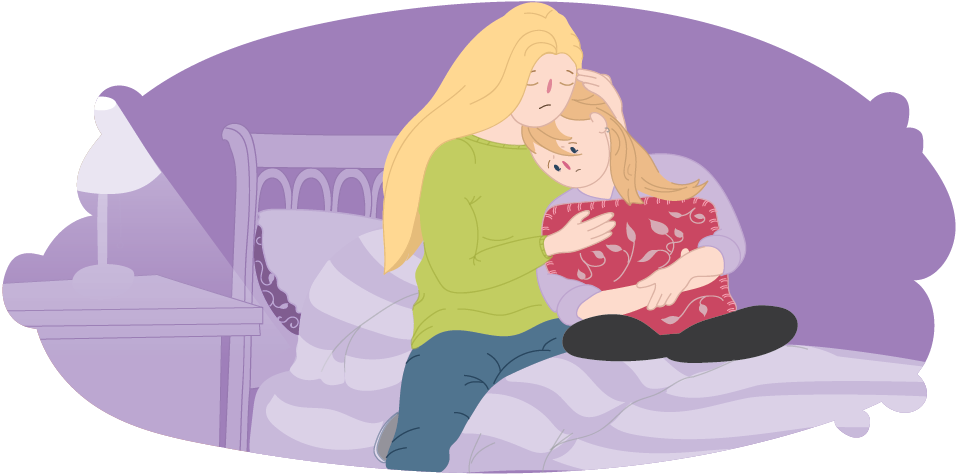Understanding child physical abuse
Learn more about what physical child abuse is, the signs and impacts ...
READ MEIn this article we’ll explore what child sexual abuse is and what you can do to help keep your child safe.

If you believe a child is in immediate danger or a life-threatening situation call Triple Zero (000).
Sexual abuse can be physical, verbal or emotional. It can include but is not limited to:
Child prostitution
Forcing a child to watch a sexual act
Having sex with a child, including oral sex
Persistently intruding on a child’s privacy
Speaking to a child in a sexually explicit way
Showing pornography or naked pics/videos to a child
Taking pics/videos of a naked or partly naked child
Exposing genitals or being naked in front of a child
Sending sexual content to a child online or through text
Kissing, holding or touching a child in a sexual way
Asking or making a child touch genitals or perform sexual acts
Making sexual comments to a child in person, on the phone or online
It often involves persuasive and manipulative tactics to gain the trust of a child and sometimes their caregiver by developing a bond.
It often does not start with sexually abusive touch or behaviours. It is very carefully planned and it can take place over weeks, months or even years.
It can be recognised by looking out for signs such as:
A child might not verbally tell you they have been abused but they may say or do things that provide some clues. Some behavioural signs of child sexual abuse may include:
Unexplained accumulation of money or gifts
Disordered eating or preoccupation with body
Aggression, destroying property, substance use
Excessive compliance or a desire to be overly obedient
Poor self-image, poor self-care, lack of confidence
Persistent sexual themes in drawing, stories and play
Regressive behaviours (soiling or urinating in clothing)
Running away, recklessness, suicide attempts or self-harm
Sexual behaviour or knowledge that is advanced or unusual
Sleep disturbance, fear of bedtime, nightmares, bed wetting
Not wanting to be left alone with a particular individual/s
Excessive masturbation or masturbation in public after age 5
Changes in behaviour - withdrawn, anxious, aggressive or fearful
Unusual or repetitive soothing behaviours (hand-washing, pacing)
Difficulty concentrating, memory loss or decline in school performance
Inappropriate sexual play with themselves, other children, dolls or toys
Some signs may include :
Children may experience a range of emotional, psychological and physical problems as a result of being sexually abused. These effects can cause both short and long term issues.
Short term effects may include:
Long term effects may include:
Regressive behaviours
Suicidal ideation
Promiscuous behaviour
Sexual difficulties
Sleeping and eating disorders
Post-traumatic stress
Self-harm or suicidal thoughts
Alcohol and substance misuse
Nightmares, zoning out or not listening
Engagement in risky behaviours
Difficulty concentrating or memory loss
Development of mental health issues
Low self-esteem or lack of self-respect
Have exceedingly high expectations about themselves
Poor attendance or performance at school
Difficulty forming trusting and positive relationships
Anger, aggression or self-destructive behaviour
Have difficulty in identifying and expressing their needs
Increased illness, body aches or other physical complaints
Confusion around identity, their worth and their sexuality
Talk about body parts early – Teach your child the proper anatomical names for their body parts, such as penis, vagina or anus.
Let you child know that their body belongs to them – Talk about the difference between safe and unsafe touches and teach children they can say no to touch that makes them feel scared or uncomfortable.
Teach them that some body parts are private – Tell your child that their private parts are called private because they are not for everyone to see.
Teach your child body boundaries – Explain body boundaries and that it is not OK for anyone to touch their private parts or ask them to touch theirs.
Talk about body clues – How the body can give us warning signs when we are not feeling safe.
Tell your child that body secrets are not okay – Tell your kids that no matter what anyone tells them, secrets about their body are not ok and they should always tell you if someone tries to make them keep a body secret.
Teach your child how to get out of scary or uncomfortable situation – Such as saying ‘No’ or ‘Stop’ in a loud voice. They can also tell the person that they need to leave to go to the toilet and then find an adult to talk to.
Use appropriate resources or games – To reinforce safety messages and to help children to recognise, react and report when they don’t feel safe. Visit Keeping Kids Safe for more information.
Child protection is everyone’s business! Some adults have a legal obligation to notify authorities (these obligations differ between states and territories).
Encourage the child in your life to contact Kids Helpline if they need some extra support to cope with what has been happening.
You may find talking to somebody outside of the situation helpful. You could try calling Parentline in your state or territory to discuss your concerns.
For some guidance on responding to disclosures of child abuse, see our article on Responding to disclosures of child abuse.
Understanding child physical abuse
Learn more about what physical child abuse is, the signs and impacts ...
READ MEResponding to disclosures of child abuse
When a child discloses abuse it can be hard to know how ...
READ MEFamilies impacted by domestic violence
Domestic violence can happen in any family. It’s never ok and ...
READ METalking helps! We’re here for your kids.
No problem is too big or too small.
We're here 24 hours a day, 7 days a week